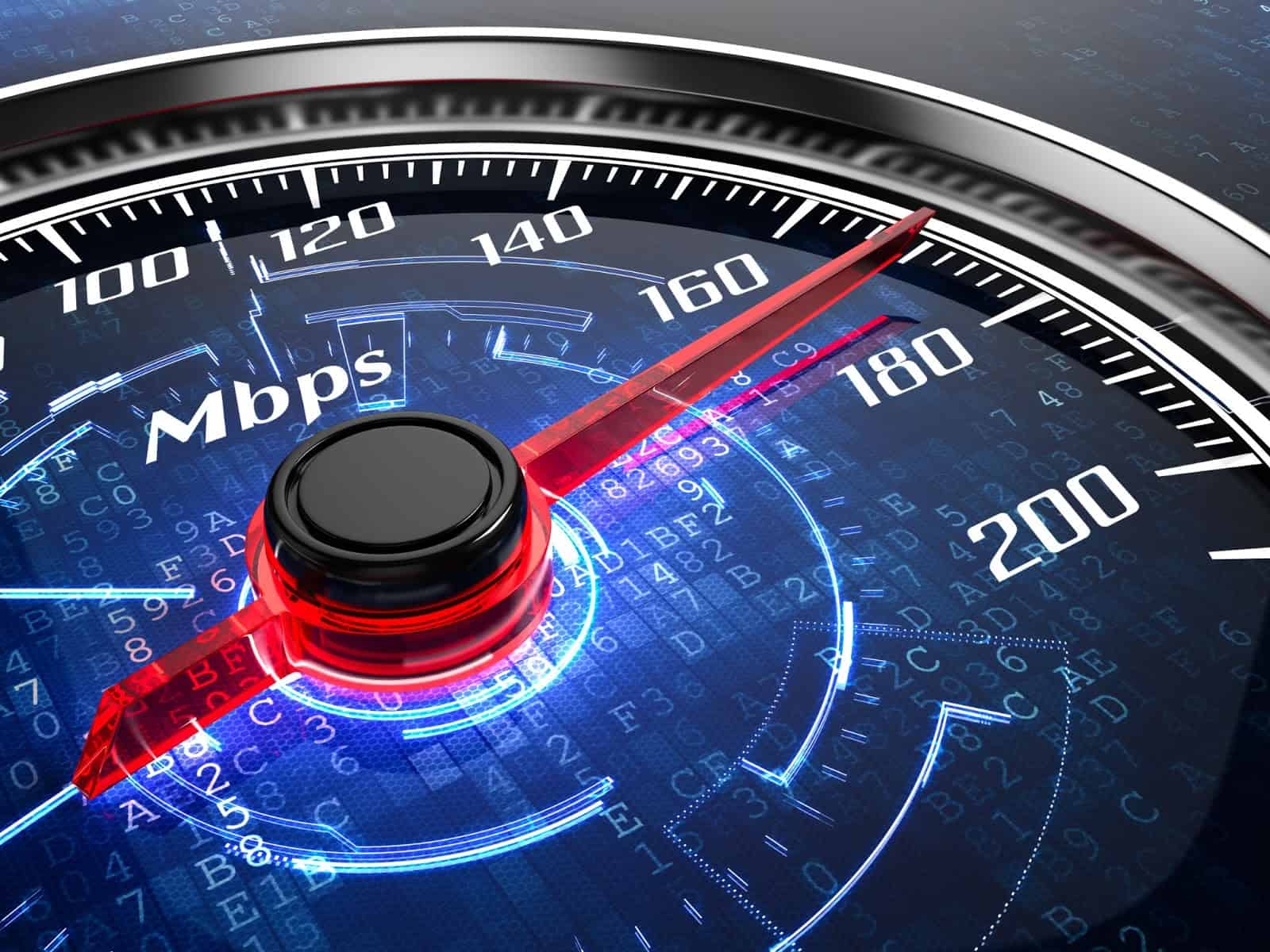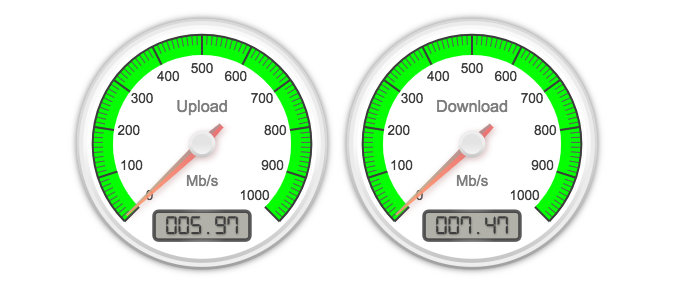What Are Optimal Download and Upload Times. Internet Speed on Your Phone
Simply put, cyberspace speeds in the 100–200 Mbps range are ideal for well-nigh households since they can handle common activities like streaming and video chat for two to v users at once. However, several factors should likewise exist considered — especially for domicile offices and gaming where upload capacity for files and reaction times are especially important.
Along with upload speeds, latency, and your location, another factor to consider is your Wi-Fi network. The average Wi-Fi speed you feel around your habitation will generally be anywhere from 20–fifty percent below the advertised download speed due to wireless interference and fade as you move further from the router. With that said, it'south of import to choose a speed slightly faster than what you need to account for network slowdowns.
While each household will have their own definition of what a practiced internet speed is based on their needs, here are a few simple guidelines on dissimilar speeds and what they can handle:
| Internet Speed | Users Supported | Speed Summary |
|---|---|---|
| 25 Mbps | 1-2 | Basic |
| 100 Mbps | iii-4 | Average |
| 200 Mbps | 4-5 | Fast |
| 500 Mbps | 5+ | Very Fast |
| 1,000 Mbps | 5+ | Gigabit |
To get a quick recommendation based on the number of users and devices in your home, take a look at our bandwidth calculation tool. If you already have Wi-Fi and are having slower-than-normal speeds, try troubleshooting your Wi-Fi, or consider learning how to extend your Wi-Fi network.
In this article, nosotros help you determine how much internet speed you demand based on how many internet users are in your home and how they use the internet.
Mbps stands for "Megabits per second." This is the standard measure out of "speed" or "bandwidth" on home cyberspace connections. Information technology measures how many $.25 (units of digital data) can be transferred each second. You'll ordinarily run across speeds ranging from x–i,000 Mbps advertised for home internet plans.
How Much Speed Do I Really Need?
Hither are some full general download speed requirements based on everyday online activities:
- Cheque email and browse the web: i-5 Mbps minimum
- Stream HD content: 5-25 Mbps minimum
- Stream 4K content and play competitive online games: 40-100 Mbps minimum
- Stream 4K content, play competitive online games, and download very large files: 200 Mbps minimum
What Is a Good Cyberspace Speed?

Any internet connection in a higher place 25 Mbps is a good internet speed. The FCC currently defines a "broadband" internet connection as one that provides at least 25 Mbps for download speed and 3 Mbps for upload. This is a decent criterion for the boilerplate family of iii; however, larger households of three to 5 people should consider speeds closer to the 100–200 Mbps range.
In lodge to be a "skillful" internet speed, the connection has to meet the needs of the household, which will vary based on number of devices connected and how many people use the connection at one time.
The experience using an internet connexion depends on several factors:
- How many devices are continued and in apply simultaneously?
- How many people are streaming video from Netflix, YouTube, or another service?
- Are you using your home Wi-Fi for competitive online gaming?
- Do you ofttimes demand to send large files for piece of work?
- Do y'all regularly stream 4K video, or do yous mostly stick to uncomplicated online tasks?
- Practice you become frustrated easily if your game lags or your webpage takes a while to load?
As you can run into, good cyberspace speed can hateful something unlike for every household. For instance, if you're using your home Wi-Fi for only web browsing and electronic mail, y'all might feel that you take fast internet with only x Mbps.
On the other manus, someone who streams 4K video on multiple devices, plays video games online, and has smart home IoT devices, may not be satisfied with fifty-fifty 100 Mbps. They should wait at cobweb options similar those offered by AT&T Cobweb internet or Frontier Communications FiberOptic which offers higher uploads speeds than other mutual connections similar cable and DSL.
It's worth mentioning that the range of performance yous can get is somewhat relative to your location. Rural areas in states like California and even New York ofttimes have much lower speeds (around 25 Mbps) and fewer options, when compared to urban centers inside the state which typically have 100+ Mbps plans available, such every bit Los Angeles, San Diego, or Brooklyn.
What Is a Fast Cyberspace Speed?
By most definitions, annihilation above 100 Mbps is considered "fast." In one case you get-go getting close to one Gbps (1,000 Mbps), the internet programme is called a "gigabit" service.
If you're wondering why anyone would ever demand a one Gbps or higher download or upload speed, the answer is pretty uncomplicated: most of us don't (though that may modify in the time to come). That said, these sorts of speeds may be worth information technology for techies, gamers, streamers, and large households.
What Is the Difference Between Upload and Download Speed?
If you don't know the departure between upload and download speeds, hither is a simple breakdown:
- Download speed: how speedily your internet connectedness can call back data from the net (web pages, video, cat photos, etc.)
- Upload speed: how chop-chop your net connection can ship information from your devices up to the internet (uploading video to YouTube, sending documents via electronic mail, etc.)
When you encounter the advertised speed of an internet plan, what you usually see is the download speed. The upload speed isn't visible at outset, or it appears in a much smaller size at the bottom.
Download speed is much more than important for the average user since you merely find upload speed when trying to share large files. It's normal for your upload speed to be effectually one tenth your download speed. However, fiber net users oftentimes have symmetrical (or identical) download and upload speeds.
How Fast is 25 Mbps?
A 25 Mbps plan can be referred to as the "Goldilocks" of internet plans. Information technology's neither too fast nor also ho-hum. For a small household of light internet users, you won't endure from frustrating lag or pay for bandwidth that you lot don't need.
Hither are some things you can expect from 25 Mbps:
- Stream Netflix and YouTube at 1080p on 1 or two devices without buffering
- Play almost online games without lag
- Almost zero await time for loading most webpages
Then, is 25 Mbps fast?
For a small household that isn't doing intense streaming on multiple devices or gaming at loftier-resolution, 25 Mbps is relatively fast. For larger households or for internet users that demand 4K resolution, 25 Mbps may still non be enough. The biggest cistron here will be the number of devices being used at a time. Almost any household can become away with 25 Mbps as long equally the number of users/devices online at a time is limited. For example, 3 to four people can stream in Hard disk with a 25 Mbps connectedness, but anyone else trying to get online will likely experience a slow connection.
Best Cyberspace Speeds for Streaming

Bones streaming doesn't crave very much bandwidth. However, when you start to stream in 4K resolution or stream on many devices at once, you will need a much larger internet package.
How Much Internet Speed Practice I Need for Netflix?
In general, streaming videos on platforms such every bit Netflix or YouTube TV requires 3-5 Mbps to stream in HD.
If you desire to stream in 4K Ultra Hd, you will need a minimum of 25 Mbps. Withal, streaming even i video in 4K HD may use up all of your available bandwidth. For that reason, if you similar HD video and you lot have more than one device connected at a time, we recommend a speed of fifty Mbps or more than.
For instance, say you have a 25 Mbps downwardly connection speed. If the full capacity of your internet connection was a pie, each device on the network gets a "slice."
Your full potential speed is carve up across all of the devices connected to the network. So, a 25 Mbps plan may only be providing 10-15 Mbps on Netflix — depending on how many devices are taking a "piece."
Besides, using Wi-Fi will always be slower than a hardwired connection. Trying to stream over Wi-Fi tin can produce less-than-stellar results.
Thankfully, there are a few things yous can do to ensure that you're maximizing your chances of a problem-free streaming experience:
- Connect your streaming devices to the router with an ethernet cable whenever possible.
- When streaming over Wi-Fi, position the streaming device as close to the router equally possible, with no physical barriers like walls or furniture between them. This will assist you achieve a more stable connexion.
Utilise our bandwidth calculator to go an judge of the speed yous actually need to stream on multiple devices at home.
All-time Internet Speed for Gaming
Online gaming is one of the few activities that require a fast upload speed. This is because the actions that you perform in-game are uploaded to a server for other players to view and interact with.
How Much Internet Speed Practice I Demand for Gaming?
Minimum cyberspace speed requirements for gaming are usually 4-8 Mbps if nobody else in the business firm is using up your bandwidth. Unfortunately, slower internet plans such as these may non requite y'all the upload speed you need for a consistently good feel.
If you're the just ane at domicile, a 25 Mbps internet programme is recommended for smooth gaming. However, speed isn't the simply matter that matters in gaming: ping and latency play a function as well.
Ping and Latency: Does It Matter?
Latency is a measurement of the corporeality of time information technology takes for information to exist transmitted from one point to another. Ping is often used interchangeably to describe this, just in fact, a "ping" is simply the act of hailing a certain receiver. Nether this definition, latency is a measurement of how quickly you can "ping" the server you are trying to attain.
Then, is latency a real concern when deciding which service provider to choose from?
Honestly, the bulk of users will probable not be impacted past latency. Latency is more than of an event for satellite internet users every bit information technology takes longer for data to travel and is more susceptible to interference than wired cyberspace connections (i.eastward. cable, DSL, and fiber). Competitive gamers serious nearly getting the best connection volition definitely want to look into minimizing this number by either upgrading to a cable or cobweb cyberspace connection or connecting their gaming device directly to their modem/router.
Mbps vs Gbps: What's the Difference?
Internet speeds are measured in "Megabits per second," often abbreviated as "Mbps." These commonly range anywhere from i Mbps up to 1,000 Mbps.
- 1 Mbps: ane Megabit per second
- One Gbps: one Gigabit per second, or ane yard Megabits. (one Gbps is the maximum for most dwelling internet plans, so you volition ofttimes see fiber providers advertise "gigabit service" or "gig speed.")
An boilerplate MP3 song in your iTunes ranges from three to v megabytes, whereas a 4K movie or tv show can exist several gigabytes, and then it'southward of import to estimate the types of speeds you'll need accordingly.
Bits vs Bytes
The amount of information you use is measured in "bytes," while the speed you lot tin move data is measured in "$.25." For instance:
"The average cablevision internet program has a download speed of 150 Megabits per second (Mbps), and a data cap of one,024 GigaBytes (GB)."
MB vs GB: What's the Difference?
This is confusing for non-techies, simply to put information technology simply:
- MB: MegaByte (a million bytes of data)
- GB: = GigaByte (a billion bytes of data)
You will likely see the term GB used in conjunction with data caps, which some providers use to limit the amount of data y'all can swallow. These can either be hard capped (service is not bachelor after exceeding the stated amount) or soft-capped, significant you will simply experience slower speeds — and potentially, additional charges.
Why Does Internet Speed Vary Per Location?
You may notice a certain company offering fast speeds in the subdivision adjacent yours — only to search your net options and find they can't provide the aforementioned speed for your street. This can be frustrating.
Regardless of which type of service you're interested in, your concrete connection has to go somewhere cardinal before information technology tin move on to the wider network that forms the backbone of the cyberspace. For DSL and cablevision, this central location is the provider's office or joining node, and for fiber, a central switch.
No matter the specifics, the physical distance between your dwelling and these meeting points can take an impact on the speed of service a particular company is able to offer. Remember, though — just because one provider can only offering a certain speed, that doesn't necessarily hateful all of them are express in the same way.
If you live in an expanse where in that location are several services to choose from, check the speeds offered past other ISPs in your area before setting an install engagement.
How Can I Calculate My Upload and Download Speed?

If you lot already accept existing service but aren't certain how fast it actually is, you tin can find out using our speed test tool.
Essentially, this service works by sending test samples of data to diverse remote servers, the same way you would when browsing the web.
We then brandish the boilerplate upload and download speeds of those private pieces of information, allowing you to get a good idea of what you're working with.
The Bottom Line: 25 Mbps Is the Minimum Speed for Modern Households
So how much speed do you need? If you lot don't take time to dig into the details, merely make sure y'all get a plan with at least 25 Mbps download speed. For most people, this is "skillful enough."
All the same, plans are constantly changing, sometimes offer faster speeds for lower prices. We recommend getting the fastest plan your preferred provider offers under $100 per month — peculiarly since it's possible to become gigabit fiber cyberspace for simply $60-$lxx per month.
For more detailed recommendations based on your specific household size and number of devices, visit our internet speed computer.
Source: https://broadbandnow.com/guides/how-much-internet-speed-do-i-need